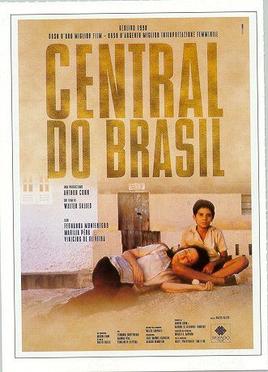
Walter Salles' Central Station is a touching, well-made motion picture whose only real flaw lies in the over familiar storyline. This kind of film explores the bond between a motherless child and a lonely older woman, has been attempted so frequently that good acting and direction are no longer enough. The script must offer a new and compelling quality, something to draw us into the narrative and make us really care about what happens to the characters. Another interesting aspect of this picture is that it presents a rare look at non-tourist locales in Brazil.
The film opens inside a large train station in Rio de Janeiro, where Dora (Fernanda Montenegro) is going about her daily job. At a dollar's price, she will write a letter for one of the many illiterate passers-by in the station, and then seal it in an addressed envelope. When it comes to mailing the letters, however, Dora is not trustworthy. Based on arbitrary criteria, she posts some letters, tears up others, and stashes a few in a drawer. Dora doesn't care when she betrays a trust; she has made the determination of what's best, and decides whether or not to send a letter based on that judgment. She stands aloof and uninvolved, making her assessments dispassionately. Until she meets Josue (Vinicius de Oliveira), that is.
Josue is the 9 year-old son of a woman who dictates a letter to Dora. In it, she asks the boy's father if they can be reunited. When leaving the station afterwards, the woman is struck by a bus and killed. Josue, with nowhere to go, begins to loiter around the station, acting pugnacious and withdrawn. His plight stirs something in Dora (she has seen the fate of shoplifters, who are shot, and she reasons that, without her intervention, a similar fate awaits Josue), who brings him home, then sells him to an adoption agency. However, when her best friend notes that Josue is too old to be adopted and that the organization may be a front for organ thieves, Dora kidnaps the boy from the agency, then goes on a journey with him, searching for his father.
The two leads both do superlative work. Fernanda Montenegro believably conveys the changes in Dora as her relationship with Josue transforms her inner self. It's a finely-tuned portrayal that doesn't ask the audience to accept any sudden or hard-to-swallow shifts in behavior. Dora's rebirth is gradual. Newcomer Vinicius de Oliveira doesn't have as complex as role to essay, but his performance as a young, lost boy touches the heart. Together, the two actors create a palpable, and very special, bond (not only with each other, but with the audience).

Central Station placed third in the 1998 Toronto International Film Festival's popular balloting (behind Life is Beautiful and Waking Ned Devine), which is a testament to its mass appeal. The reason is understandable. Central Station is both literate and emotionally powerful an increasingly rare combination. It does not rely upon camera tricks or overwrought performances to touch the viewer. There's manipulation going on here, but it's subtle and skillful, and, as a result, we don't feel like our heartstrings are being twisted and pulled by an unseen puppeteer. For that reason, Central Station is well worth seeing, especially if you're in the mood for an affecting drama.
No comments:
Post a Comment